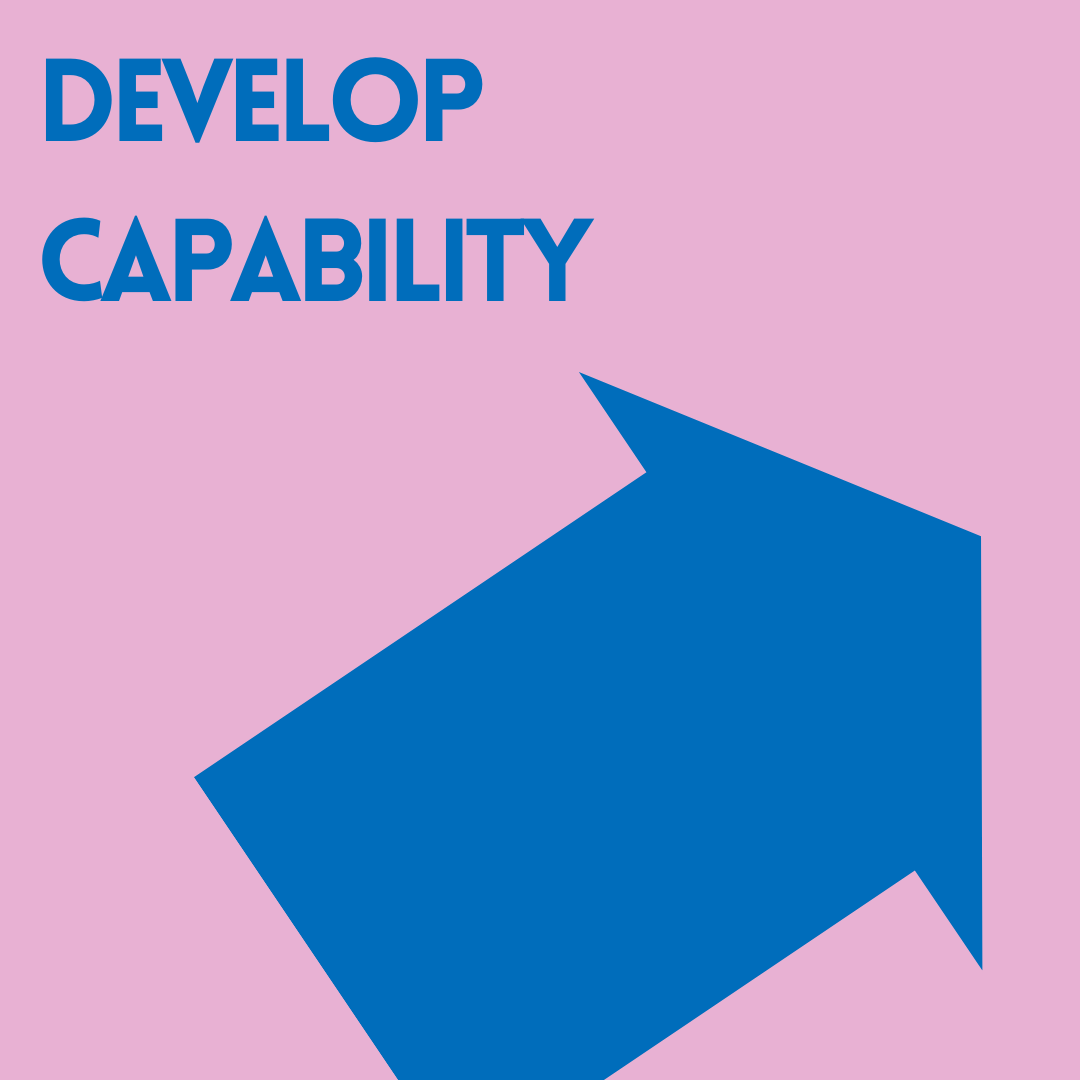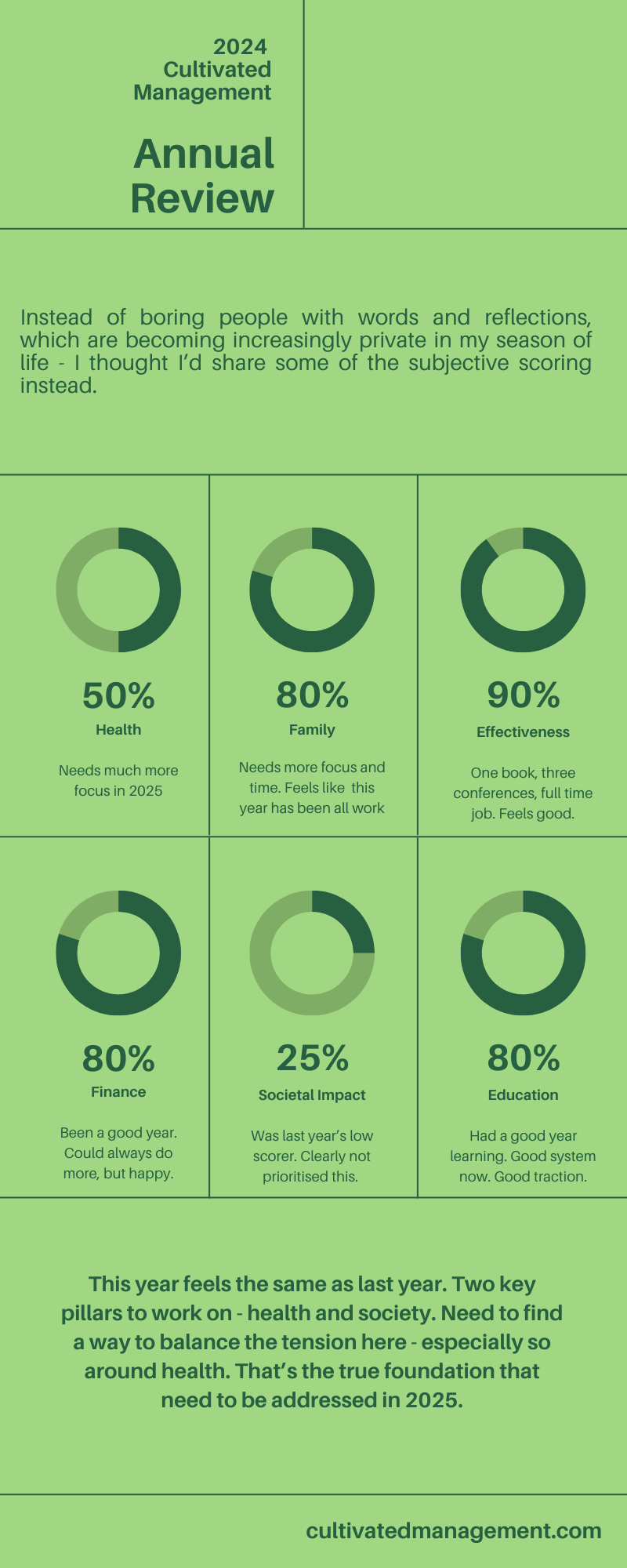Work (and life) can be pretty hectic for many of us. We have competing demands, decisions to make, events that knock us sideways and a whole set of other balls we're juggling.
It can be tempting to let the winds of life push and pull us around, until we're so far of course, we cannot even tell where we are anymore. It can be tempting to let things unfold as they will and deal with the consequences.
But, if you're a leader or manager though, or in fact, if you have anyone else relying on you - it's important to get some semblance of control in your life.
Here are 5 areas I encourage people to expend energy and attention on in work (and life). I use these in any role I move into, especially leadership roles, and I use these in my own life.
The 5 areas I recommend are (and of course, it's merely an idea to play with - make up your own, mash these with others, scour the web for other ideas):
- Focus
- Organisation
- Culture
- Capability
- Succession
Focus
It can be tempting to be try and tackle everything. The modern workplace seems awash with more work than people can do; with everything being the top priority. More work with less, and with an ever increasing amount of work in the "system". And we try to do it all.
I like to describe this using a funnel.

We have lots of "stuff" we can do but we only have so much energy, attention, capacity and capability to get this stuff done.
If we force too much into our system (the teams doing work), we'll block it up, explode it, break it, make it leak - use whatever term you wish. It won't get done, or the team, under so much pressure, will deliver sub-quality work. And leave. Or burnout.
We can expand the system of delivery with more people maybe - but more people often doesn't solve the problem - and creates problems as well. We can always make the system of delivery more effective and efficient - but there's only so far we can make a system more effective until we overload it (or we spend longer ON the system of work than getting things through it).
And so, we must implement some qualifying filters somewhere. A qualifying filter is a point in time when we whittle down the list of everything we could do, into things we really should do.
Where you put these filters, how many, and when etc is contextual. But we must somehow filter through all of the demands and stuff we could do - and focus on only that which helps the business stay alive and deliver value.
This requires focus. Focus means we choose some things over others. If we do this, we can't do that.
One simple approach I always use is to ask the people in charge (leaders or managers) to "force rank" the "stuff" that needs doing.
Force ranking is about only having one No.1 priority. One No.2. One No.3. One No.4. etc. I typically do the top ten - always ensuring only one piece of work can exist at any of the 10.
It doesn't matter whether these are big projects, small projects or anything in between.
What, in all of what needs to be done, is priority number 1, then 2, then 3?
If you find people wanting to put more than one thing against each ranked numbers, then try harder. There can only ever be one single thing that is the highest priority.
If everything is a top priority then nothing is.
It's hard to do this. It makes people uncomfortable. People will be upset, annoyed, they may even cry.
Deciding on this priority is not simple, but firstly start with the strategy, then maybe use some form of matrix or decision making tree if you wish. Of course, the problems that are slowing you down or preventing you achieving your goals should be in this list too - otherwise, how will they get resolved? It's all work that needs to be done.
In my experience, everyone already (at least at the leadership level) knows what the highest priority piece of work is.
It's the thing that will get them fired if they don't deliver it. It's the thing that will unleash the most value if completed. It's the thing their boss is always focusing on and asking questions about. It's the thing that is causing customers to leave.
List them out - 1 to 10, and discard, or shelve the rest.
You may be able to work on priorities 1, 2 and 3 at the same time. Good. Only you will know whether you, and your teams, have that level of capacity. But try not to be tempted to work on everything at once and deliver nothing.
It's better to get one piece of work, or project, done to 100%, than it is to have 5 projects never completed.
Focus is the key here.
Focus and orientate the organisation or team around achieving your top priority. And don't overflow the system - it will push back harder than you can imagine.
Focus is the key to getting things done, unleashing energy, opening up opportunities and mobilising talented people to use their skills. When people are confused about what they should be doing, how their work connects to the big picture, or have competing priorities they will suffer because of it.
Cultivated Management is all about building workplaces where work gets done and the workplace enriches the lives of all who work in it. The single best way to start this journey is to focus on a few things and do them well. The rest will wait. And if your boss isn't sharing this same mindset, then show them the top ten list and ask them what they think. Ask them what their priority is. Ask them to help.
If something new comes in - what has to stop? If we can only do 10 things this year, what are they?
Organisation
Good leaders and managers are organised. They have focused their's, and everyone else's energy, on the top priorities for the business.
They have check-ins in place to track progress, unblock and help teams. They are managing risks. They are talking to the individuals under their supervision every single week in a 1:2:1. They are getting to know their staff. They have control over their calendar - including scheduling family time, down time and deep work - they are organised around their pillars of life.
They have measures, metrics, goals and outcomes in place - and tracked. And of course, all of this is leading to a wonderful bright future with a painted picture.
They are leaning into obstacles and helping to improve the system.
In a nutshell, they are organised. They guard their's, and their team's, energy and attention. They say "no" a lot.
This is being organised.
The word organised comes from Medieval Latin meaning "act or process of organizing, the arranging of parts in an organic whole".
This is what good people do. They bring together the moving parts of an organisation - and try to arrange it as a whole. They are not trying to control it, or structure it, or micromanage it, or dominate it. That is a fool's game. An organisation is organic - it is always evolving.

But what they are doing is applying a lens to it. They are observing and studying. They are connecting the dots. They are learning about the system they work in. They are drawing physical or mental maps of how work moves and how the organisation works. They are company smart.
And they keep an eye on things - to ensure they're always up to date about how the system works. And they know their part in it - and play it well. This is being organised - knowing what is happening - and how it all connects together.
Organisation is also about ensuring the right people are in the right place, at the right time. This is about ensuring people are structured in the right teams, and have everything they need to bring their best selves to work. This is about building the team to get it done and utilising their strengths.
Culture
Good leaders and managers are the role model of high behaviours. They set the bar and they encourage others to reach it. They don't chastise or punish people who don't make it, but they encourage, nurture, nudge and support.
Holding the high bar is essential - after all, we shouldn't hold people to a standard that we're not prepared to meet.
People will also mimic and copy the behaviours of leaders and people of influence. And behaviours are nothing more than the culture of your organisation.
Paying attention to the culture is essential. It starts with working out what sort of culture you want, then thinking about the behaviours you need - and then developing them in yourself first.
Behaviours can be documented, observed, nudged, talked about, described, hired for and encouraged. And in doing so, you will set the high bar and help others to get close to it.
If you get your own behaviours right - you'll start to see a culture emerge that has variation and diversity and richness but ultimately - it has the positive behaviours that make your organisation or team an enriching place to work.
It's your culture (and behaviours) to nudge as you see fit, but the 10 behaviours of effective employees is a decent place to start.
Paying attention to your own behaviours is a personal life time quest - one that never ends. Could you be better than you were yesterday, are you ok as you are, are their some habits you'd like to change, do you treat people with respect by default? Etc etc.
You cannot make people behave in any single way - but you can role model through your own behaviours first, explain the behaviours you expect and give people feedback when behaviours are not good. After all, you don't get the behaviours you expect, you get the behaviours you tolerate.
And if the culture of your team or organisation is not positive, not happy, not good, not delivering, toxic....then draw a circle around yourself first and look for problems there.
It's rare for a team to not exhibit the same behaviours as good leaders and managers.
Capability
Capability is, in some respects, similar to behaviours. Learning, growing, training, developing are all merely a way to enhance and improve behaviours.
However, I call this one out separately as it's more about embracing and planning for the future.
Where are we going - and do we have the capability to get there? Are we investing in people's learning and personal growth through training, but more important, on-the-job training?
Do we need to hire somebody who has already done what we're trying to do - to shortcut our approach and share their knowledge too?
What kind of work will we be doing in a year - and are we ready? If not, what do we need to action now? What do we need to focus on?
Capability is simply having the ability to do what you need to do right now. And if you've been building a good strong team, then you should be able to tackle what's in front of you right now.
But what about the next 6 months? What about a year? Should we start investing in our capability now? Or wait until we need some capability we don't have?
Should we buy it in, nurture it or outsource it? All key questions for managers and leaders.
And on a personal level - are you capable for now and the future?
Succession
A good leader and manager is always looking for single points of failure and succession.
They are also looking for who could take their own role. Maybe they're hoping to move "up the ladder" or do something different, or pursue a dream outside of this company. Who will take over? Who is ready?
With single points of failure comes epic risk. If you have just one person who knows how something works, or does a specific role, you may want to consider succession planning. You may want to train someone else up, or hire in somebody who knows how to do this.
Who's ready to take your role? Who have you been delegating responsibility to in order for them to grow? Who has the right behaviours to continue and grow the culture and the team? Who's ready?
These 5 areas are merely 5 out of no doubt 100s, but they are the 5 I start with.
- Focus - do we know what we're doing. Do we have clarity, alignment and right action?
- Organised - are we structured in the right way? Are we personally organised and clear? Do we have decent routines and processes in place?
- Culture - are we building a team that gets things done, and enriches the lives of all who work in it?
- Am I upholding high standards of behaviours whilst also being vulnerable, creative and acknowledging my own mistakes?
- Are we treating people well? Am I nudging better behaviours to grow the culture?
- Capability - are we capable of doing what is in front of us right now? What about 6 months time?
- Is there something I need to know now, that I don't?
- How am I growing as an individual to face what comes to us?
- Succession - do we have any single points of failure within our team? Who's ready for the next step? If someone leaves what will we do?




